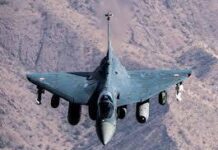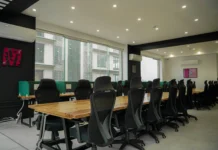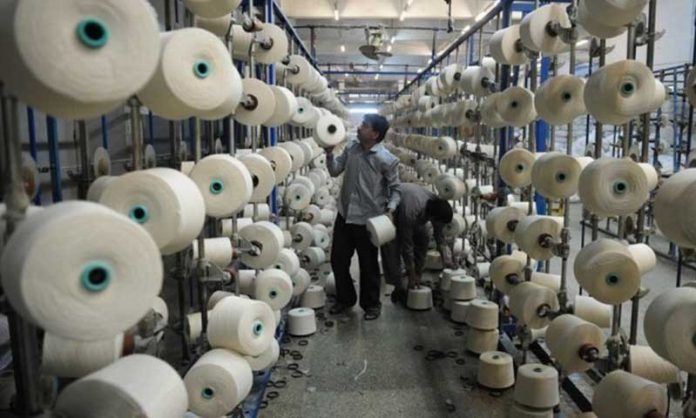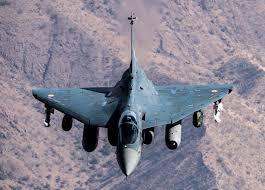- APTMA claims 10pc annual growth in exports, Rs 105.2 billion cost savings expected if proposals put into action
All Pakistan Textile Mills Association (APTMA) Chairman Aamir Fayaz proposed several measures for the revival of Pakistan’s textile industry, including removal of customs duty on imported cotton, duty-free imports of man-made fabrics, tax rebates and tax refund on packaging material under a zero-rated regime.
He proposed these measures in a meeting held with Trade Development Authority of Pakistan (TDAP) Chairman SM Muneer.
Aamir was of the opinion that the primary reason for falling exports is the high cost of business. Over the past three years, textile and clothing export performance have been consistently deteriorated. According to the statistical data presented by APTMA, the exported quantity of cotton cloth, knitwear and cotton yarn went down by 35pc, 10pc and 28pc, respectively. Readymade garments, bed wear and towels also showed similar downward trends.
This decrease in our statistics came at a time when other regional players experienced growth in their textile exports. According to APTMA, India has grown by 13pc over the same time period, Bangladesh has gone up by 12pc, China experienced growth of 11pc and Vietnam grew its textile exports by 40pc.
To add salt to the wounds, not only Pakistan’s exports are falling but around 30-35pc of the production capacity of the industry is also impaired. The provincial breakdown of the textile industry further showed that a major proportion of this idle capacity came from Punjab. In monetary terms, this idle capacity in the country’s industry is worth approximately $3.5 billion, according to the APTMA chairman.
Proposing solutions to the aforementioned problems, Aamir suggested that the government should play its role for the revival of the textile industry. He suggested that the 4pc customs duty on the import of cotton should be removed and duty-free imports of all MMFs should be allowed for all MMFs that were not being produced in the country.
He further suggested that the government should permit the drawback of taxes and levies and extend the DLTL on export value of yarn and greige cloth at 4pc, processed fabric at 5pc and bedwear, towels and knitwear at 6pc.
Catering to the problems of investments in the textile machinery, the chairman gave a $6 billion “step up” plan for spinning, weaving, processing and garments machinery. According to the projected data, 18pc of this investment will go towards garments which would provide for approximately 220,000 new stitching/set up machines.
15pc of the budget will be allocated to spinning which would allow for BMR and Technology replacement for 10 million.
Furthermore, approximately 19pc of the investment would go to 10,000 new Airjet Looms for the weaving sector. The remaining 49pc would be dedicated to the processing industry that will supply 225 new dye ranges. He also mentioned the problems accrued to the textile industry by the high costs of energy.
Proposing solution pertaining to such problems, he said that a multi-year tariff should be determined by the NEPRA for the industry without the inclusion of surcharges. He recommended that the final tariff should not exceed Rs7/KWh.
According to the projections made by the APTMA, this would lead to a net financial impact of Rs13 billion for the industry. He further said that RLNG tariff should be on par with System Gas tariff (RLNG tariff be reduced to Rs. 600/Mmbtu as per system gas, as the textile industry consumes about 180 MMCFD of RLNG).
The financial impact of this measure is expected to reach Rs15 billion. He also suggested a reduction of turnover tax from 1pc to 0.25 and withdrawal of 0.25pc of export development surcharge which would yield an impact of Rs3.2 billion. Total expected financial impact of all the measures proposed by the APTMA (duties, taxes and tariffs) approximately equals Rs105.2 billion, according to the APTMA chairman.
The presentation of these proposals also included an estimated 10pc annual growth in exports over the next five years, with 2014-15 as the base year. The textile industry experienced negative growth in the current fiscal year, but the chairman gave projections of 10pc growth every year, making the total turnout to be in the positive direction from 2016-17 at approximately $13,700 million going all the way up to $2 billion by the year 2020-2021.
The TDAP chairman expressed his concurrence with the APTMA chairman’s ideas by saying that exports should be among the top priorities for any country and it was high time that Pakistan caught up to its competitors by reducing the costs of doing business.
























